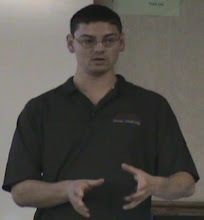
I saw this posted the other day, a PhD thesis by Green out of University of Nottingham: Towards a formally verified functional quantum programming language. This is another Haskell approach. As I said in my dissertation, I think there are serious obstacles in using a functional approach to quantum programming in a commercial development environment. Nonetheless it is good to see another quantum programming approach put out there. Here's the abstract:
This thesis looks at the development of a framework for a functional quantum programming language. The framework is first developed in Haskell, looking at how a monadic structure can be used to explicitly deal with the side-effects inherent in the measurement of quantum systems, and goes on to look at how a dependently-typed reimplementation in Agda gives us the basis for a formally verified quantum programming language. The two implementations are not in themselves fully developed quantum programming languages, as they are embedded in their respective parent languages, but are a major step towards the development of a full formally verified, functional quantum programming language. Dubbed the “Quantum IO Monad”, this framework is designed following a structural approach as given by a categorical model of quantum computation.


